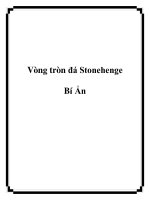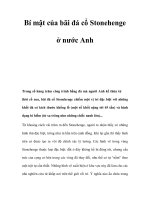55020 stonehenge
Bạn đang xem bản rút gọn của tài liệu. Xem và tải ngay bản đầy đủ của tài liệu tại đây (136.72 KB, 2 trang )
Stonehenge is situated in the South West of England in Salisbury. It
is an ancient stone circle that was built between 3000 and 2000 BC.
Nobody really knows who built it or why. Some people think it was to
worship the sun or the moon. There are many burial mounds around
it. The stones are huge, weighing 4 and 5 tonnes. They are called
bluestones and they come from Wales, more than 200 miles away!
Archaeologists think that the builders placed the stones on rafts
and sailed around the coast to bring them to Salisbury.
Match up the word and its meaning/description. Then, complete the grid.
Ancient
Circle
Huge
Worship
Build
Burial
Raft
Mound
BC
praise
small hill
simple boat
Before Christ
grave
round
massive
construct
very old
Name of monument:
Setting:
Age:
Who built it:
Theories on why it was built:
Stones:
Transport of stones:
True or false?
a) Stonehenge is a modern monument.
b) It was built about 2000 years ago.
c) The stones are marble from Italy.
d) They placed the stones on rafts.
e)Stonehenge is an ancient stone circle.
f) It was a place of burial and you can
still see the mounds (small hills).
Archaeologists think that the ancient builders
had some knowledge about astronomy. On
June 21st (the summer solstice, which is the
longest day), the sun rises directly above the
heel stone and then enters the circle through
an arch and goes directly through the central
trilithon. Because of this, many thousands of
people go to Stonehenge on June 21st to
observe this phenomenon. It is a pity, but
very often, the weather is too cloudy and you
can’t see it.
Choose the right word in the brackets.
As soon as some people (hear/listen) the word, Stonehenge, they
think of Druids. For many years, Druids held their religious
(ceremonies/parties) at Stonehenge. They are mysterious people
who (wear/ware) white cloaks. We don’t know much about their
past, or their present because they (didn’t/did) write things down.
We know they had a (lot/much) of knowledge because famous
people wrote it, like Julius Caesar. Do you think it would be better if
the Druids had written things down – for example what they did at
Stonehenge?





